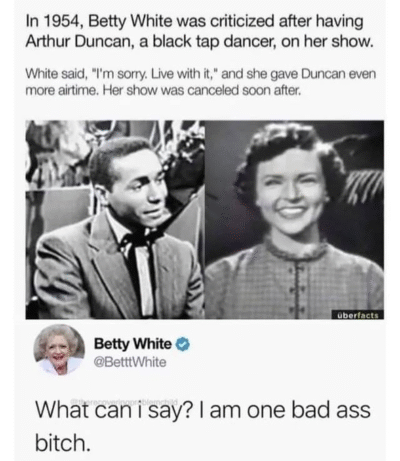In the 1950s, a period marked by segregation and racial discrimination, Betty White made a bold move on her variety show, "The Betty White Show," by f
In the 1950s, a period marked by segregation and racial discrimination, Betty White made a bold move on her variety show, “The Betty White Show,” by featuring Arthur Duncan, a Black tap dancer, as a regular performer
Given the societal norms of the time, this decision was considered controversial, taboo even.
Despite receiving criticism and facing pressure to remove Duncan from her show, particularly from South ern states where segregation was deeply entrenched, White remained firm in her decision.
ern states where segregation was deeply entrenched, White remained firm in her decision.
Her response to the demands to remove Duncan was resolute and unequivocal: “I’m sorry, but he stays… live with it.”
This stance highlighted her commitment to racial equality and placed her at odds with a significant portion of her audience and the prevailing social norms of the time. Heck, present day too.
Betty White’s refusal to bow to racist pressures did not come without consequences. Her show faced boycotts and was eventually canceled. However, her actions left a lasting impact, contributing to the gradual shift in attitudes towards race and inclusivity in the entertainment industry.
canceled. However, her actions left a lasting impact, contributing to the gradual shift in attitudes towards race and inclusivity in the entertainment industry.
Therefore, Betty White’s legacy is not only that of a widely beloved and hilarious television icon but also as a champion of equality and an early advocate for the integration of television at a time when it was neither popular nor profitable.
Extraordinary Strength. Extraordinary Courage. Extraordinary Talent.
Betty White
January 17, 1922 – December 31, 2021